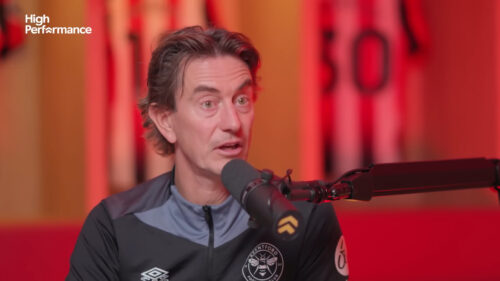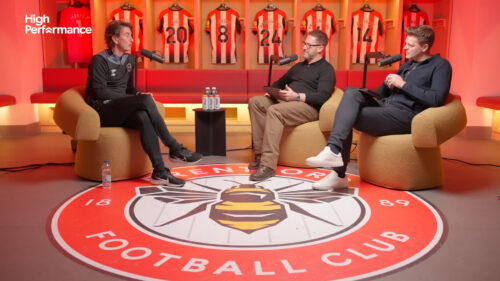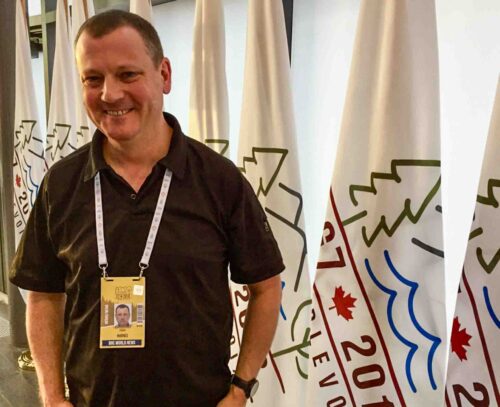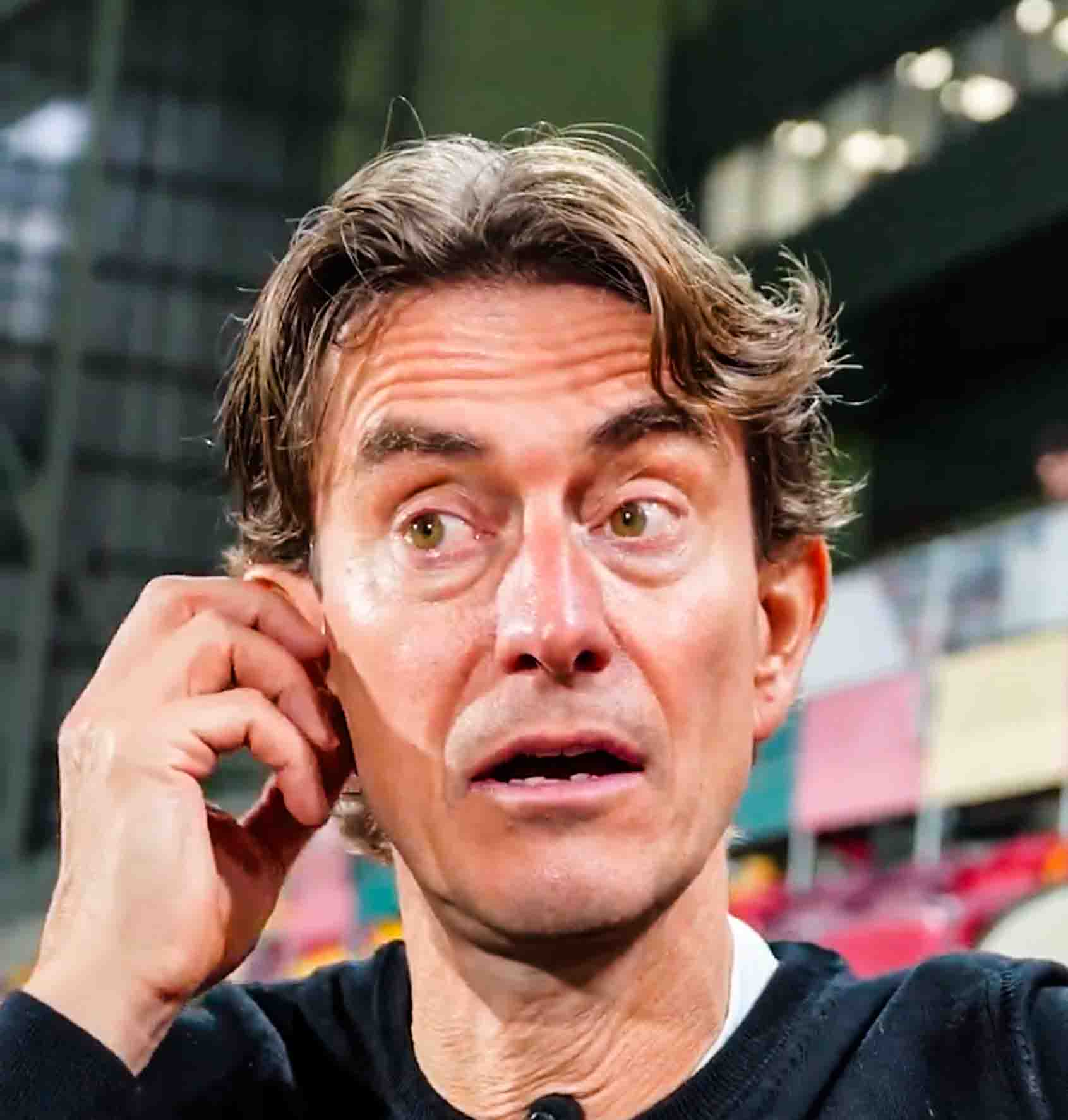Thomas Frank provides a fascinating insight into the values and culture behind Brentford’s success in a new podcast.
In his six years as Brentford’s head coach, Thomas Frank’s down-to-earth approach, intelligence and humility have made him one of the most admired figures in English football.

On the “no d**kheads” rule? Frank is uncompromising – “they’ll need to leave.”
In a new podcast, recorded in the dressing room at the Gtech Community Stadium, he gives his most in-depth insights to date of what makes him tick and the values he’s embedded at every level of our club.
The hour-long conversation with Jake Humphrey and Damian Hughes from “High Performance” delves deep into the mind of the Dane. At the heart of Thomas Frank’s philosophy is his belief that it’s Brentford’s people and culture – not just data and analytics – that have driven Premier League success.
Of course, he has a stat for that – 95% of Brentford’s success stems from its culture and the individuals who contribute to it, he estimates.
“Culture beats everything,” Frank insists. At Brentford it’s a culture based on passion, attitude and hard work. Open communication, a welcoming atmosphere and strong bonds between players and staff are critical.
Frank believes in trusting his staff and players, empowering what he calls “cultural architects” who embody the traits and behaviours he expects.
He singles out skipper Christian Nørgaard as a natural leader who sets high standards and interacts well with the squad. Mathias Jensen, Yoane Wissa, Vitaly Janelt and Ben Mee are also highlighted for their commitment, emotional intelligence and the guidance they give to others.
Soon after arriving at Brentford, Thomas Frank outlined his “No d**kheads policy” – a zero-tolerance attitude towards anyone showing disrespect to other teammates or staff. Not surprisingly, it’s a phrase that has stuck – and the policy is still clearly very much in force. How would he respond to anyone breaking the “no d**kheads” rule? Frank is uncompromising – “they’ll need to leave.”
Frank’s evolving philosophy doesn’t take place in isolation, though. He reveals that he learns from other experienced figures in football, including Roy Hodgson, David Moyes, Sean Dyche, Graham Potter and Gareth Southgate. His confidential chats with them help him navigate the complexities of managing a football team and refine his approach.

As for his leadership style, our head coach describes himself as logical and calm, someone who prioritizes clear communication, confidence, and belief. While acknowledging the importance of showing “some personality and presence,” he says he does his utmost to control his temper and not let emotions influence his decision-making. He likens coaching a team to raising his children. Players, he says, thrive on “demands, consequences and love.”
Success at football’s highest level doesn’t come without sacrifices, though. Thomas Frank describes the sport as “brutal,” consisting of “10% joy and 90% suffering.” He talks of the “hidden costs” – missed family birthdays, holidays and social occasions – but insists he has no plans to “just go home to be a teacher in Denmark.” Surviving in the pressure cooker of the Premier League, he explains, requires a difficult work-life balance. Family and friends are “the biggest thing in life…much more important.”
So what is Thomas Frank’s philosophy in a nutshell?
- Success is a team sport. It can’t be achieved alone. Surround yourself with talented, hard-working people who share your values and vision.
- Culture matters. A lot. It’s not just a fancy buzzword; it’s the foundation of everything. Sustained success requires an environment where people feel valued, supported, and empowered.
- Never stop learning. The world is constantly changing. Be adaptable and willing to embrace new ideas. Don’t be afraid to step outside your comfort zone and seek out new knowledge and perspectives.
- Find your balance. Ambition is important, but so is well-being and personal relationships. Don’t let success come at the cost of happiness.
For Thomas Frank, leadership isn’t about being the loudest voice in the room; it’s about creating a space where everyone can shine. It’s about building a culture of trust, respect and collaboration, where everyone feels like they’re part of something bigger than themselves. This, he believes, is the ultimate recipe, the “secret sauce” for high performance on and off the pitch.
Watch Thomas Frank’s conversation with the High Performance podcast on YouTube.
With thanks to “High Performance Podcast” for the photos of Thomas
Stuart Hughes

Stuart began his career editing radio interviews at BBC Wales on quarter-inch tape with a razor blade and chinagraph pencil!
He has covered major news events in more than 60 countries, and his assignments have included the 9/11 attacks on the US, the wars in Afghanistan and Iraq, the Arab Uprisings, the death of Nelson Mandela, the Syrian civil war, the migrant crisis and, most recently, the COVID-19 pandemic. While reporting from Iraq in 2003, Stuart was critically injured when he stepped on an anti-personnel landmine, which led to the amputation of his lower leg. The cameraman he was working with, Kaveh Golestan, was killed in the incident. After learning to walk again, Stuart resumed his career using a state-of-the-art prosthesis. This life-changing event has given Stuart a particular interest in reporting on the long-term cost of war on civilians and combatants.
Stuart works to raise awareness of the physical safety issues faced by journalists operating in war zones and the potential psychological toll of reporting conflict.
Stuart Hughes is a Visiting Fellow at Bournemouth University’s Faculty of Media and Communication.
He is also an Ochberg Fellow at Columbia University Graduate School of Journalism in New York and a Kiplinger Fellow in Public Affairs Journalism in Columbus, Ohio.

